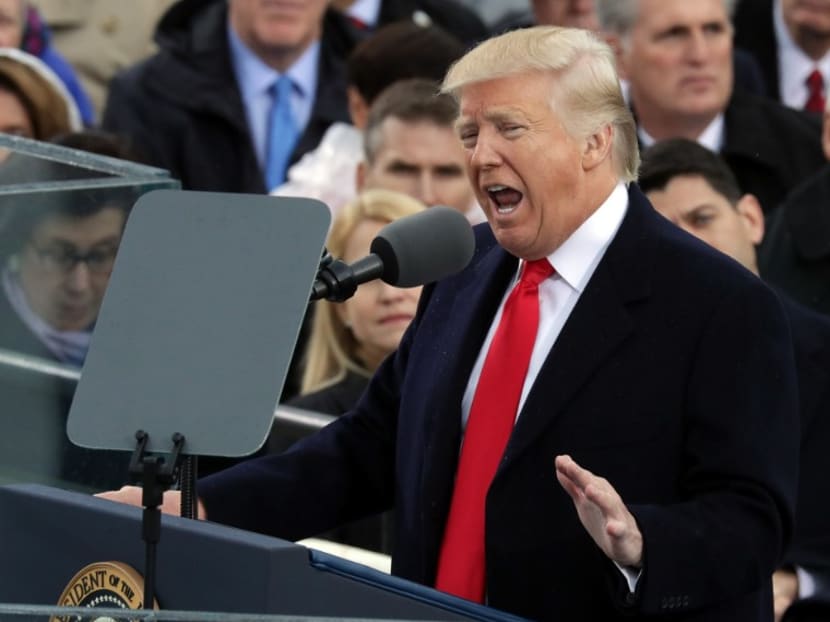Analysis: Trump speech shows America getting what it ordered
If anyone was expecting an evolution from Donald Trump the candidate to Donald Trump the president, never mind.

United States President Donald Trump delivering his inaugural speech in Washington D.C. on Jan 20, 2017. Photo: AFP
WASHINGTON — America is getting what it ordered on Election Day.
If anyone was expecting an evolution from Donald Trump the candidate to Donald Trump the president, never mind.
The new president delivered an inaugural address on Friday (Jan 20) that was straight from his campaign script – to the delight or dismay of different subsets of Americans.
Mr Trump gave nods to unity and began with kind words for outgoing US President Barack Obama, but pivoted immediately to a searing indictment of the status quo and the Obama years.
Presidents past have promised an American Covenant, a New Frontier, a Great Society.
Mr Trump sketched a vision of "American carnage".
Then, he promised to end it with a nationalist "America First" approach to governing.
It was a speech for Mr Trump's supporters, but maybe not those who voted for somebody else.
When Mr Trump told the crowd on the National Mall and watching from afar that "everyone is listening to you now" and spoke of a "historic movement the likes of which the world has never seen before", he seemed to hark back to his voters.
"At some point, there has got to be a transference to being the leader of all the people," said Connecticut Governor Dannel Malloy, chairman of the Democratic Governors Association.
Former House Speaker Newt Gingrich, though, heard "exactly the speech Trump needed to give to be the kind of president he wants to be".
"In a very workmanlike way, he was reasserting precisely the themes that had gotten him elected," Mr Gingrich said.
"He is trying to communicate how he sees the next few years from his perspective: It will basically be pitched again and again as the people versus the establishment, and it will be constant striving to reform the system."
In his 16-minute inaugural speech, Mr Trump spoke in grim terms of families trapped in poverty, shuttered factories dotting the landscape like tombstones, of rampant crime, drugs and gangs.
It was an echo of the bleak message he delivered at the Republican National Convention and likewise short on specifics for how he will solve those problems.
His pledge to make things better came wrapped as a nostalgic paean to better days long gone.
"America will start winning again, winning like never before," the new president said.
"We will bring back our jobs. We will bring back our borders. We will bring back our wealth. And we will bring back our dreams."
Nostalgia works for some Americans, but not all.
"If you're an African-American, 50 years ago doesn't seem so great to you," said Mr Michael Gerson, a former speechwriter for President George W. Bush and a frequent Trump critic. "You need some kind of vision for a future America."
The new president "amplifies resentments" in the name of pursuing change, added Mr Gerson. "It's always us vs. them."
Mr Trump did directly take on the nation's modern security challenges by giving a blanket promise to "eradicate completely from the face of the earth the scourge of Radical Islamic Terrorism” – a capitalised phrase that the Obama administration refused even to utter.
But Mr Trump has given few details about how he will do that.
Granted, inaugurals are not meant to be wonky policy speeches, but they must be backed by a plan of action to have oomph.
As the new president took office, whitehouse.gov was filling up with policy pages that were long on broad goals and light on specifics.
And the question marks about his policies on taxes, trade, immigration, terrorism, and more are magnified by the sometimes contradictory policy pronouncements coming from his Cabinet nominees.
The uncertainty about Mr Trump also stems from his own shifts in tone.
Democratic Senator Chris Murphy said Mr Trump's luncheon speech in the Capitol immediately after his inaugural address was considerably more conciliatory.
"When he's in front of a crowd, he's going to roar populism, and then when he's inside the Capitol, he's going to buddy up to folks and say: ‘We can all work together’”, Mr Murphy said.
Going into Friday's inaugural address, Mr Trump already had a lot of work to do to rally the nation behind him.
Just 40 per cent of Americans have a favorable view of him, far lower than any other president-elect's popularity since at least the 1970s, according to a Washington Post/ABC News poll.
And if he cannot deliver on the bold promises of his inaugural, he will lose those he does have in his corner.
"The speech is notable for laying down very specific markers by which his presidency will be assessed,"' says Kathleen Hall Jamieson, a communications professor and director of the Annenberg Public Policy Center at the University of Pennsylvania. "The categorical nature of those markers is going to be problematic for him."
Mr Gingrich put it more bluntly: "If he keeps us safe and creates jobs, he will almost certainly be re-elected. If he can't do those things, he's in deep trouble." AP






